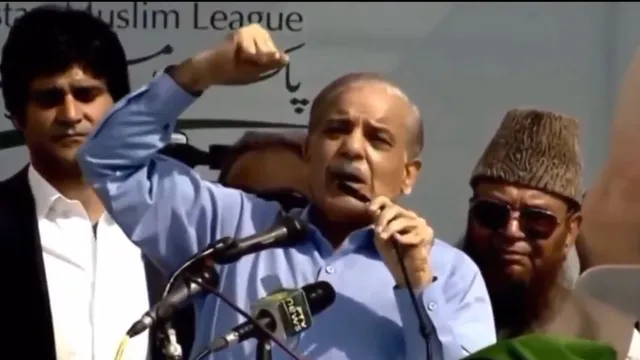- By Ajeet Kumar
- Sun, 23 Feb 2025 04:23 PM (IST)
- Source:JND
In what can only be described as an intense, high-energy speech, Pakistan Prime Minister Shehbaz Sharif made a bold declaration that has left the international community both scratching its head and checking their calendars. "If we don’t leave India behind, then my name is not Shehbaz Sharif," he stated emphatically, as the crowd erupted into an enthusiastic round of applause.
"If we don’t leave India behind, then my name is not Shehbaz Sharif. We will work day and night. A day will come when we will make Pakistan a great nation and move ahead of India," Sharif said while smashing the podium.
If I don't defeat #India, my name is not Shehbaz Sharif," says PM Shehbaz, pledging to outpace regional rivals like India in development. Speaking in Dera Ghazi Khan, he emphasized the need for unprecedented federal-provincial collaboration to steer Pakistan towards progress.… pic.twitter.com/nQudEuLH2K
— Ghulam Abbas Shah (@ghulamabbasshah) February 22, 2025
"Even WiFi signals struggle to stay strong in Pakistan"
The speech was delivered at Dera Ghazi Khan, where he also inaugurated several development projects. His furious speech quickly went viral as people around the world tried to decipher what “leaving India behind” actually meant. Was it a metaphor? A literal race? Or possibly just a very high-stakes game of tag? His speech left many wondering if he had mistaken the event for a political speech or a motivational seminar on personal growth.
"Shehbaz Sharif wants to defeat India, but even WiFi signals struggle to stay strong in Pakistan First defeat dengue, debt, and default before aiming for India," wrote a user on X. While another user asked, "So, what will be his new name?"
The comment came a day before the two countries are set to pthe Champions Trophy 2025.
Pakistan economic crisis
Earlier last month, the International Monetary Fund (IMF) revised cash-strapped Pakistan's economic outlook, downgrading its projected Gross Domestic Product (GDP) growth for 2025 to 3 per cent, down from 3.2 per cent forecasted just three months ago. The adjustment comes amid a broader global economic assessment presented in the IMF's "World Economic Outlook Update: Global Growth Divergent and Uncertain", The Express Tribune newspaper reported.
The IMF's revised projections also indicate that Pakistan's GDP growth will remain at 4 per cent in 2026. However, the latest downgrade reflects ongoing economic challenges in the country, although the IMF did not provide specific reasons for the revision.
(With inputs from agency)

